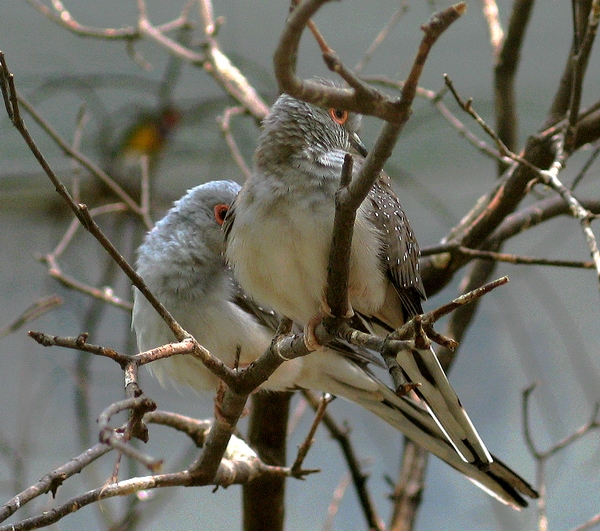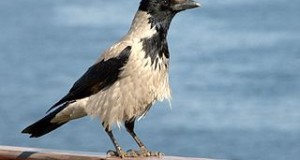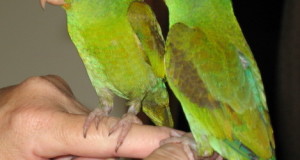 General
General
This charming, canary-sized bird is an ideal choice for those drawn to doves but unable to meet the space requirements of Ring-Necks and other larger species. Both wild and captive-bred strains are beautifully colored and possess a wide range of pleasing calls. Diamond Doves tame easily and make responsive and affectionate pets, often bonding quite strongly to their owners.
Please see Diamond Dove Natural History for more information on these fascinating birds.
Enclosure and Physical Environment
Provide your doves with as much room as possible – the minimum cage size for a pair would be along the lines of the A & E Victorian Top Cage (28” x 15”). If kept in a cage of this size, the doves should be let out for exercise on a regular basis. Larger bird cages are preferable if you are not able to give your birds much free-flight time
Diamond Doves spend a good deal of time on the ground, and do best in a solid-bottomed cage. Remove the bottom grate from your cage, as such will lead to foot problems.
The cage should be located in a draft-free room that receives a good deal of sunlight (but beware of over-heating). Diamond Doves love to sunbathe, and will gather in sunlit spots with wings and tails fanned.
As window glass filters out the sun’s beneficial UVA and UVB rays, be sure to provide your doves with a full spectrum bird bulb (Please also see my article Providing the Proper Type and Amount of Light to Pet Birds). These little doves are quite alert to their surroundings, and definitely enjoy looking out a window.
However calm your doves may be by day, they will likely respond frantically to unusual nighttime noises (this is true of most birds, but particularly so for doves). If nocturnal disturbances are possible, leave a small bulb lit at night so that the birds will not crash into cage walls if startled. R-Zilla’s Incandescent Nightlight and similar bulbs (designed for reptiles, and usually tinted red or blue) provide light and some heat but will not disturb the birds’ sleep cycle.
Diamond Doves are ideally suited to outdoor aviaries, and in such situations will display their full range of natural behaviors to best effect.
Heat and Humidity
Diamond Doves hail from harsh Australian environments, and are consequently quite hardy despite their fragile appearance. Temperatures of 50-90 F are handled easily, and humidity is rarely a concern (if kept outdoors, however, they should be provided a dry shelter). Drafts should be avoided.
Feeding
Diamond Doves consume a varied diet in the wild and should be provided with the same in captivity. Please bear in mind that doves swallow seeds whole, without cracking them – most commercial pigeon or dove foods (seed or pellets) will be too large for these little fellows to handle.
I suggest as a basic diet a mix consisting of 50% Pretty Bird Premium Food for Canaries and Finches and 50% white millet. To this add a daily ration of pre-crushed Lefabre Premium Daily Pellet Diet for Parakeets, which will assist in their getting enough Vitamin D3 (especially important if the doves do not have access to unfiltered sunlight). You can also offer some Goldenfeast Australian Blend, but some of the ingredients are bulky and will need to be crushed.
Diamond Doves will also enjoy picking at millet sprays and sprouting grass sprout pot. Finely grated sweet potatoes, carrots and various greens should also be provided. Hard-boiled eggs (ground with shells) should be offered once or twice each week, especially to nesting females (this is not always taken).
Finch grit must be available at all time – doves cannot grind ingested seed shells without it – and Avitron Liquid Vitamins should be added to the drinking water.
Check back next Monday for the rest of this article.
Image referenced from Wikipedia, http://en.wikipedia.org/wiki/Image:Golabek_diamentowy.jpg. Author M. Betley, under the GNU Free Documentation License.
 That Bird Blog – Bird Care and History for Pet Birds
That Bird Blog – Bird Care and History for Pet Birds



Hello, I have written in the past, thank you. I am getting ready to pick up the doves I mentioned, I have read about them and have information form my friend, but it seems that they are not suited for a cage in the same way as a parrot or canary, their form and lifestyle is different…sorry, does this make sense. My friend keeps them, they seem fine in a small cage but I’m not sure about the way I’d like to keep them, any ideas would be great thanks.
Hello, Frank Indiviglio here. Thanks for your interest in our blog.
You are quite right in that the doves’ lifestyle affects the type of cage in which they are best kept. Parrots climb a great deal, and so make good use of cage space, and finches and canaries are small enough to fly about in most cages.
I believe you mentioned getting ring-necked doves in your last email…these are about robin-sized, much larger than the diamond doves that are the subject of this article. They are mainly ground-dwelling birds, so floor space is the most important consideration in cage selection…you’ll want to choose a long over a tall cage. Flight within the cage will be difficult due to their size. However, doves are usually fairly calm in demeanor; with care you should be able to give them exercise time in a room, if such is available to you. An outdoor aviary or simple screened in flight area is ideal.
A large, horizontally oriented parrot or macaw cage should be used if the doves will not have any outside flight time. Be sure to remove the grating on the cage bottom; doves do best on solid surfaces. Please let me know if you need anything further.
Best regards, Frank Indiviglio.
Another dove question please – I’m finding conflicting information on diet and concerning the use of gravel, an advice would be appreciated thank you.
Hello Lynn,
Frank Indiviglio here.
Ring necked doves are a bit larger than diamond doves, and require a slightly different diet than is outlined in this article. A good ring-neck dove diet is as follows:
50% Goldenfeast Australian Blend
25% Pretty Bird Premium Canary and Finch Food. This can be gradually replaced by Lafeber Parakeet Pellets (your doves may take some time to accept these).
25% Sun Vita Dove and Pigeon Food
Avitron Liquid Vitamins
That Fish Place Dove’s Variety Treat Pack contains a variety of foods (fruit pellets, millet sprays) which can be used to add variety to the dove’s diet. The Variety pack also contains gravel, which should always be available to your birds.
They should also be given small amounts of fresh sprouts, grated yams, carrots and greens on a daily basis (watch for loose droppings, and cut back on greens if this occurs).
Gravel should always be available (this is also supplied in the variety pack mentioned above). Doves swallow their seeds whole and, with the aid of gravel, grind them up in the gizzard. I once witnessed a pigeon (feral rock dove) autopsy at the Bronx Zoo…the gizzard was more than 1/4 filled with small stones.
Doves have e fast metabolisms and should always have food available. They tend not to search through deep bowls as do parrots…a shallow feeding dish will assure that they are consuming a good mix of seed and pellets.
Barron’s Dove Care book is useful to have on hand as well.
Please let me know if you need anything further.
Best regards, Frank Indiviglio.
Lynn, I had a pair of blue diamond doves, the male flew out the window. I live in Katy tx but this winter is cold, with 40 degree temperature. It has been 3 days now; will the male be able to survive in the wild? Also my female still calls to him and no longer sits on her eggs.
Hello Ana,
Thanks for your interest. Diamond doves are quite cold hearty, and tolerate below-freezing temperatures well if they have a dry shelter; although best results are had if they are gradually habituated to it. But 40 F shouldn’t be a concern; their internal body temperature is up around 107-110 F, and they are good at finding shelter from wind and rain. Escapees sometimes take up with native doves, and then have a greater chance of surviving.
Please let me know if you need any further information.
Best regards, Frank Indiviglio.
Thank you Frank, that puts me at ease. I leave the window open as frequent as possible but my dove has not returned, I hope it found a home. My female dove calls for him and seems aggressive toward the other doves, she is very beautiful and I would hate to loose her but I was wondering if I should set her free to find him? I was under the impression that Diamond doves could only live wild in Australia. Any suggestions would be greatly appreciated.
Hello Ana,
Thanks for the feedback. They are native to Australia, but have a very wide range there and are adaptable in terms of climate and diet (adjusting well to introduced plants as a food source, etc.). Related species have become established in foreign habitats after being released; there is a chance your bird will survive, although there are many variables.
I wouldn’t release the female, as there really is no accurate way to assess survival, and in any event it is always a bad idea to establish a species in a new environment. It may take time to re-pair your bird, but in time it will very likely accept another mate.
Please let me know if you need any further information. Good luck, enjoy and please keep me posted.
Best regards, Frank Indiviglio.
Well, a diamond dove walked into my grandfathers business ,yesterday, and he brought it home. so now I’m just looking him up to see what to do that he likes doesn’t like what to feed him. if anyone has any type of advice please. should i make him a little bed? Hes pretty quiet.. how long should i wait til i let him out the cage for freedom time?
Hello
Thanks for your interest and the unique story. Do you live within their natural range, or might it be an escaped pet?
You can keep and feed the bird as described in Part I and II of this article. If the bird is not able to fly, you should have it examined by a vet. Don’t worry about out-of –cage time until it settles in for awhile…once it’s eating well and adjusted, please write in and we can discuss exercise etc.
Please let me know if you need any further information. Good luck, enjoy and please keep me posted.
Best regards, Frank Indiviglio.
I live in NYC. My grandfathers from the middle east he has years of experience with birds. He new the sex and type of the dove when he saw it. The cage we have him in has two sticks which he flys back and forth from. I bought parakeet mix because the guy at the pet store told me thats what he feeds his diamond doves. thats all they had that was small that and canarie seed
Hello Diane
Thanks for the feedback; likely an escaped pet, it seems. They will take keet seed but canary/finch seed is preferable as the bulk of the diet. Try adding in some crushed pellets and the other items mentioned in the article; you can order via links inserted there if not available locally, but most are commonly stocked in stores. Finch gravel is very important for digestion, as doves do not crush/open seeds as to parrots and other seed-eaters.
Please let me know if you need any further information. Good luck, enjoy and please keep me posted.
Best regards, Frank Indiviglio.
I just received 2 diamond doves as a gift and I don’t know alot about them, the females seems to be roosting all day. Should I be concerned that she’s sick or could it just be she’s adjusting to new enviroment?
Hello Trish,
Thanks for your interest. There are many factors that need to be considered, but in general the bird should be feeding, on and off, throughout the day. Please write back with details concerning their cage, diet etc. It would be a good idea to have the bird seen by an avian veterinarian if it does not change its behavior; please let me know if you need help in locating someone.
Best regards, Frank Indiviglio.
Hi frank
I’m a 17 years old and have had my DD for well over a year w/a numerous amounts of successful clutches. I saw you write the fallowing” DD can survive under freezing temperatures” I don’t think that’s true my DD ALMOST ALL died last winter , I read in an article that the lowest temp. They should be kept at was 50F.
I bring mine inside if it ever gets below 50F as I’ve learned from my mistakes, I had a baby die ( couple months old) the night it froze outside. So my question to you is…at what temperature should DD be left outside for a long period of time ?
Hi Leo,
Thanks for the input. I believe my comment concerning freezing temperatures was in response to a reader whose dove had escaped. I wrote that they can survive freezing temperatures but that they are best acclimated to such slowly, and they should have access to a dry shelter. This is true, but the safest low-side temperature is 50 F, as mentioned under “Heat and Humidity”. I know of private keepers in NY and the UK who give their doves outdoor access throughout much of the winter, but the birds have been acclimated properly. In cool weather, rain is a great concern as well; a dry shelter should always be available if you plan on trying them outdoors in any season.
Plese let me know if you need further info, enjoy, Frank